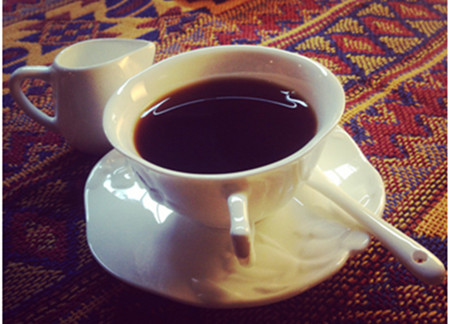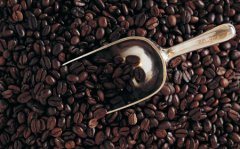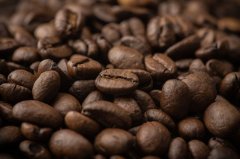Introduction to boutique coffee beans-- the characteristics of civet boutique coffee the price of Musk Coffee
Coffee beans generally go through the process of shell fermentation, coffee beans in the civets' intestines, special bacteria provide a unique fermentation environment, the flavor becomes unique, particularly thick and mellow. The coffee beans fermented by civets' intestines and stomach are very thick and mellow, so they collect civets' feces, sift out the coffee beans and brew them to drink. Due to the scarcity of production and the unique fermentation process, the flavor is very different from that of ordinary coffee.
Eva, the owner of Special Cafe, is a coffee enthusiast who travels around the world every year in search of rare goods. She told reporters that the "Kopi Luwak" was once a tribute from Indonesia to the Dutch royal family. At that time, the industry regarded the coffee with the name "cat shit" as a joke, and people didn't get interested in the Kopi Luwak until it was specially reported in National Geographic magazine.

High price
The Kopi Luwak Initiative is the least produced coffee in the world. A bag of 50 grams of coffee beans is worth 1500 yuan, and only 4 cups of coffee can be brewed. In other words, the price of a cup is about 400 yuan. The annual global output does not exceed 400 kg. Today, villagers in these areas not only collect wild Rwaka feces, but also begin to raise Rwaka in captivity. Large pots of picked coffee cherries were placed in front of Rwaka, and the hungry Rwaka had no choice but to eat all the coffee cherries. The taste of Rwaka coffee produced in this way is naturally greatly reduced. "scarcity is precious", which has led to the high price of KopiLuwak, a rare treasure. I'm afraid you'll have to prepare £50 for a cup of coffee, and you may not be able to find it everywhere.
In Indonesian, "Kopi" means coffee, and "Luwak" is the name commonly known by Indonesians as "civet". It is said that the coffee produces no more than 500 pounds a year, and the price per pound ranges from $300 to $800, depending on the year, because there is not a fixed production every year.
In the international market, Luwak coffee has always been a veritable luxury, and one of the main reasons is that it is not made by people but by wild animals. Traditionally, the coffee fruit is washed or sun-treated, removing the skin, pulp and sheep skin, and finally taking out the coffee beans, but Luwak coffee is made by natural fermentation in wild animals. What's more, these wild animals are found only on small islands like Indonesia, and their time and place are mysterious, and their number is decreasing day by day. Although Indonesia has claimed that the number of "civets" has rebounded steadily through protection and artificial feeding, the temptation of human taste buds, which depends on its digestive system, cannot be compared with products of the industrial era.
"civets" are omnivores. They are withdrawn by nature and like to walk at night. They live in tropical rain forests, subtropical evergreen broad-leaved forests, mountain thickets or hills, mountains and grasses below 2000 meters above sea level. Its food includes small beasts, birds, amphibians and reptiles, crustaceans, fruits and seeds of insects and plants. The civet likes to choose the most mature, sweet, juicy coffee fruit in the coffee tree as food, while the coffee fruit passes through its digestive system and is digested only by the pulp on the outside of the fruit. The hard coffee beans are then excreted intact by the civets' digestive system. This is the "natural fermentation method" that was once scoffed by Americans. It is said that when Americans heard about this way of making coffee, it was regarded as a fantasy, and it was not until it was reported by National Geographic that they became interested in it.
Luxury goods
In the international market, Luwak coffee has always been a veritable luxury, and one of the main reasons is that it is not made by people but by wild animals. Traditionally, the coffee fruit is washed or sun-treated, removing the skin, pulp and sheep skin, and finally taking out the coffee beans, but Luwak coffee is made by natural fermentation in wild animals. What's more, these wild animals are found only on small islands such as Indonesia, and their time and place are mysterious. Coupled with the destruction of their habitat, they have also been hunted and killed in large numbers, and the number is decreasing day by day. Every time farmers collect coffee beans, they have to spend a lot of time and effort to do a carpet search in the forest, and the quantity found is small. Although Indonesia has claimed that the number of "civets" has rebounded steadily through protection and artificial feeding, the temptation of human taste buds, which depends on its digestive system, cannot be compared with products of the industrial era.
Unique flavor
Indonesian coffee has the taste of earth and traditional Chinese medicine, and its consistency is among the highest in all continents. But "Kopi Luwak" has a heavier earthy smell, and its consistency is closer to that of syrup. It has a very special flavor. After drinking, there will still be a touch of peppermint cool feeling in the mouth, which is the "exclusive taste" that ordinary coffee does not have. After drinking a cup, take a deep breath or take a sip of cold water, you can obviously feel cool from mouth to throat. It's like I just ate a mint lotion.
This digestion process, so that coffee beans have an unparalleled magical change, the flavor tends to be unique, the taste is particularly mellow, rich and round sweet taste is also unmatched by other coffee beans. This is due to the fact that the civets' digestive system destroys the protein in the coffee beans, making the coffee much less bitter and increasing the round taste of the coffee beans. Experts say there is a gland near the sexual organs of the Indonesian "civet" that secretes milky oil, which has always been a precious raw material for the perfume industry. Even Shakespeare's play King Lear has this dialogue: "Please give me some civet oil to stimulate my inspiration." Others said, "this coffee is unique and is a specialty of Indonesia." Drink it, it's like finding a diamond in a stone. " Because the wild "civets" are obviously better at selecting good coffee fruits, so that this kind of coffee has outstanding characteristics.
As the activity range of Luwak belongs to low and middle altitude, most of the coffee varieties are robusta beans, while Arabica beans at high altitude are rarer. Indonesian coffee itself has the taste of earth and traditional Chinese medicine, and its consistency is among the highest in all continents, but Luwak coffee has a better taste and consistency, especially with a consistency almost close to syrup, and its flavor is very special (if it can be described by fragrance). So, if you don't like the taste of Indonesian coffee in the first place, then to be sure, you will hate Luwak coffee more; but if, on the contrary, you like the fishy smell of aged Indonesian beans or Indian-style soiled beans, you may fall in love with Luwak coffee with similar flavor.
Once at a tasting, many celebrities savoured every fragrance of Luwak coffee without being told the truth, and tried to describe their sensory reactions with gorgeous words. However, when people know the origin of this drink, they feel stomach discomfort at the same time. Luwak Coffee salespeople suggest that if you want to use this coffee to entertain a guest, either never tell him the truth, or tell him the origin of the coffee in advance and let him decide whether to drink it or not, lest he overreact.
Important Notice :
前街咖啡 FrontStreet Coffee has moved to new addredd:
FrontStreet Coffee Address: 315,Donghua East Road,GuangZhou
Tel:020 38364473
- Prev

Introduction to Fine Coffee beans-- Coffee shit Coffee beans Coffee Coffee
Civet coffee, the most expensive of all coffee beans. The game of cat and mouse in coffee beans was the first to make a name for Indonesia's civet coffee, Vietnam also had weasel coffee, Taiwan also produced masked palm civet coffee, and the Philippines, which is close to Indonesia, can certainly make civet dung coffee. Civet Coffee (KopiLuwak), Kopi (Indonesian, coffee), Luwak is Indonesia
- Next

High-quality coffee beans recommended, Guatemala is the aristocratic coffee in Guatemala coffee quality is dangerous.
Origin: Guatemala grade: excellent granule: more full acidity: excellent sour taste, mellow finish evenness: more stable roasting: moderate to deep flavor: Guatemala is located in the center of North and South America, is a high-altitude volcanic topography, and these volcanic cultivated coffee is the most ideal, the coffee produced in Guatemala is one of the top coffee in the world. Full granule
Related
- Detailed explanation of Jadeite planting Land in Panamanian Jadeite Manor introduction to the grading system of Jadeite competitive bidding, Red bid, Green bid and Rose Summer
- Story of Coffee planting in Brenka region of Costa Rica Stonehenge Manor anaerobic heavy honey treatment of flavor mouth
- What's on the barrel of Blue Mountain Coffee beans?
- Can American coffee also pull flowers? How to use hot American style to pull out a good-looking pattern?
- Can you make a cold extract with coffee beans? What is the right proportion for cold-extracted coffee formula?
- Indonesian PWN Gold Mandrine Coffee Origin Features Flavor How to Chong? Mandolin coffee is American.
- A brief introduction to the flavor characteristics of Brazilian yellow bourbon coffee beans
- What is the effect of different water quality on the flavor of cold-extracted coffee? What kind of water is best for brewing coffee?
- Why do you think of Rose Summer whenever you mention Panamanian coffee?
- Introduction to the characteristics of authentic blue mountain coffee bean producing areas? What is the CIB Coffee Authority in Jamaica?

